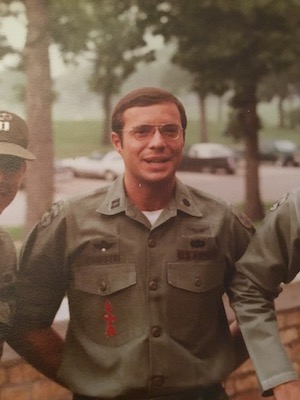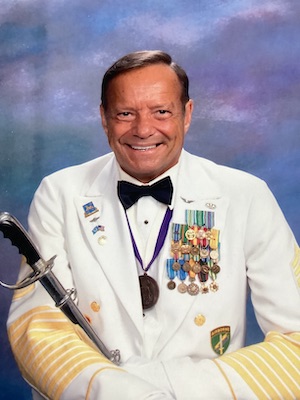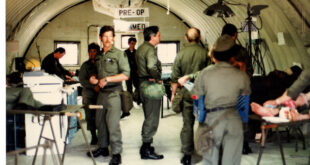What started out as a brief stint in Vietnam for this highly decorated Army veteran blossomed into an illustrious 44-year career that encompassed a variety of roles in Military Intelligence and Civil Affairs.
The younger of two sons, Darryl Chiostri was born at Cabrini Hospital to Louis and Mary (Doro) Chiostri, who were living at the time in an Italian neighborhood at 24th Street and Western Avenue. The family moved to Berwyn soon after, and then to North Riverside when Chiostri was 7. Extended family lived close. “When we got together for holidays, there were a lot of people,” Chiostri recalls.
His paternal grandparents emigrated from Tuscany and his maternal grandparents from Hungary. Chiostri’s mother grew up in the old neighborhood, learning to speak the language from her girlfriends and learning to cook from their mothers. Italian was spoken in the Chiostri home and when his paternal grandmother moved in, there were two Italian cooks. A favorite was crostini made with chicken livers. “I loved that,” Chiostri says. “My brother and I would fight over it.”
Chiostri attended Komarek grade school and graduated from Fenwick High School. He earned a bachelor’s degree in political science and history from Northern Illinois University.
As a child, Chiostri played Army instead of baseball because of his asthma, and he befriended a neighbor, an Army veteran of World War I and World War II. The veteran told Chiostri stories about the wars and patriotism and showed him his military memorabilia. “At age 5, 6, 7, I knew that I would be in the Army,” he says.
 Chiostri enlisted in the Regular Army in May 1969, hoping to go to Vietnam. He told the recruiter, “I want to be an officer and I want to be in military intelligence.” His application was denied due to his asthma. “I was crestfallen; I wanted to be in the Army all my life,” Chiostri says. The recruiter ripped up the paperwork and said, “We’ll fill it out again.” Chiostri was accepted, completed basic training at Fort Dix, New Jersey, and advanced training at Fort Leonard Wood, Missouri.
Chiostri enlisted in the Regular Army in May 1969, hoping to go to Vietnam. He told the recruiter, “I want to be an officer and I want to be in military intelligence.” His application was denied due to his asthma. “I was crestfallen; I wanted to be in the Army all my life,” Chiostri says. The recruiter ripped up the paperwork and said, “We’ll fill it out again.” Chiostri was accepted, completed basic training at Fort Dix, New Jersey, and advanced training at Fort Leonard Wood, Missouri.
He attended Officer Candidate School for Engineers at Fort Belvoir, Virginia, striving to be among the top three graduates in order to continue into Military Intelligence. A few months in, the Army needed intelligence officers and half the class was chosen. “So I lucked out,” says Chiostri. He graduated as a Second Lieutenant in Military Intelligence.
The new officers were offered choice assignments in Europe if they extended. “There were guys doing it left and right,” Chiostri says. “I didn’t want to avoid Vietnam; I enlisted to go to Vietnam. Since we would not extend our contract, we would have to accept whatever the Army sent us.” Chiostri was sent to the Army’s language school to learn Vietnamese. “Normally one would have to extend just to attend the school, but since the Army chose to send us, there would be no further commitment. I couldn’t believe how lucky I was,” Chiostri says. “It was icing on the cake.”
Chiostri attended the Defense Language Institute in Fort Bliss, Texas; graduated from Intelligence School at Fort Holabird, Maryland; and received orders for Vietnam. With 30 days before deployment, Chiostri opted to attend Airborne School at Fort Benning, Georgia. Knocked out on his first jump, Chiostri suffered temporary double vision and the doctor reported, “Individual is not fit for Republic of Vietnam Duty.” He told Chiostri, “Here’s your pass, you don’t have to go to Vietnam.” Chiostri says, “I said, ‘What? Every time I turn around you people don’t want to send me to Vietnam. I want to go to Vietnam!”
Chiostri persevered, his military profile was changed, and he deployed to Saigon in April 1971 and was stationed at Tan Son Nhut AF Base with the Strategic Research and Analysis unit of the Military Assistance Command Vietnam (MACV). “In other words, I would be doing background information on the entire Vietnamese War. Its history, its current events, its doctrine,” Chiostri says, “everything that I had wanted to do.”
Chiostri was part of Combat Support, which included Military Intelligence, Signal Corps, Transportation Corps, Military Police, and Quartermaster Corps. “For every one man out in the field getting shot at, he is supported by seven people who are not,” says Chiostri, “people who are keeping him out in the field fighting.”
American advisers were attached to Vietnamese officers in the field and the advisers reported on the strength and influence of the Viet Cong infrastructure. It was Chiostri’s responsibility to ensure that the monthly statistic collection program was completed and delivered to Washington, D.C. on a timely basis. “If from month to month they changed drastically, one month they say there’s only 10% of the bad guys running around our neighborhood and the next month 70% are running around the neighborhood, I would have to go out on a helicopter or small fixed-wing aircraft and find out exactly why,” Chiostri says.
 Chiostri left Vietnam in November 1971, was discharged from active duty as a First Lieutenant, returned home and was hired by the Illinois Department of Public Aid as a caseworker. In 1973, the 121st Military Intelligence Detachment from the South Side of Chicago asked Chiostri to join their unit as an interrogator. “I had practical experience (in Vietnam) and they loved it,” Chiostri says. He was promoted to Captain and eventually Commander of the unit. Chiostri fulfilled his obligation and was discharged as Captain.
Chiostri left Vietnam in November 1971, was discharged from active duty as a First Lieutenant, returned home and was hired by the Illinois Department of Public Aid as a caseworker. In 1973, the 121st Military Intelligence Detachment from the South Side of Chicago asked Chiostri to join their unit as an interrogator. “I had practical experience (in Vietnam) and they loved it,” Chiostri says. He was promoted to Captain and eventually Commander of the unit. Chiostri fulfilled his obligation and was discharged as Captain.
Several years later, he reenlisted in the Army Reserves as Buck Sergeant attached to the Tinley Park 308th Civil Affairs Brigade. Until his discharge in 2003 as Master Sergeant, Chiostri deployed to 23 countries on five continents.
As a member of Civil Affairs, Chiostri joined professionals such as doctors, lawyers, police officers, bankers and intelligence analysts who travel to a disaster or war area to better the conditions there. They act as liaisons between the civilian population and our military. “It keeps civilians out of harm’s way and keeps the civilians out of the military’s way who are trying to conduct warfare around them,” Chiostri says.
Wherever he was deployed as an Intelligence Analyst, Chiostri did the research and reported it to his Commanding Officer. Over time, it became known that Master Sergeant Chiostri could provide any kind of information. “I could tell you what to do in that foreign country, what not to do, where to go, all that sort of relevant information,” he says.
During the ethnic cleansing in Kosovo, Chiostri spent two months in Italy with Rear Headquarters coordinating intelligence information. The military had “first crack” at new electronics, which Chiostri used to monitor activities in different countries. “I was up at these top-secret conferences with people in England, Washington, D.C., Brussels, real time, and there were people talking back and forth about courses of action, and before the end of the day it would be implemented,” he says.
Chiostri retired from the Department of Public Aid in 2003 as an intake eligibility specialist. Reflecting on his military career, he says, “I did my job, nothing above and beyond the call of my job. I was successful, I was sent places, I was given medals and awards, just for doing my job.”
The above appears in the May 2024 issue of the print version of Fra Noi. Our gorgeous, monthly magazine contains a veritable feast of news and views, profiles and features, entertainment and culture. To subscribe, click here.
 Fra Noi Embrace Your Inner Italian
Fra Noi Embrace Your Inner Italian






